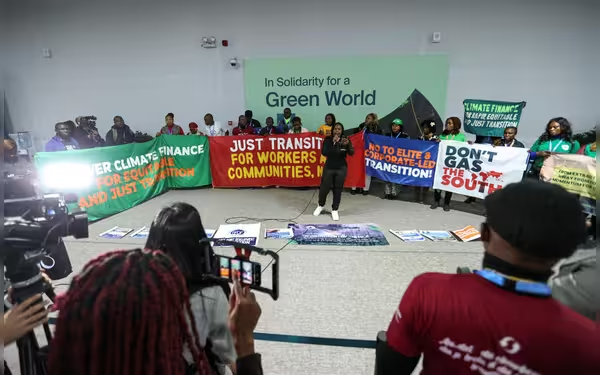Saturday, November 23, 2024 07:06 PM
UN Climate Summit Proposal Sparks Discontent Among Developing Nations
- Proposed $250 billion deemed inadequate by developing countries.
- Critics label climate finance proposal as meagre and insufficient.
- Wealthy nations urged to take meaningful action for climate support.
 Image Credits: arabnewspk
Image Credits: arabnewspkThe UN climate summit proposal of $250 billion faces backlash from developing nations, highlighting the urgent need for equitable climate finance.
At the recent United Nations climate summit in Baku, Azerbaijan, a new draft proposal aimed at addressing climate change was unveiled. This proposal promises to allocate $250 billion by the year 2035 from wealthy nations to support poorer countries in their efforts to combat and adapt to climate change. While this figure represents a significant increase from the previous goal of $100 billion per year set 15 years ago, it falls short of the expectations of developing nations that are facing the brunt of extreme weather events.
Developing countries have expressed their disappointment, viewing the proposed amount as inadequate. Mohamed Adow from Power Shift Africa stated, "Our expectations were low, but this is a slap in the face. No developing country will fall for this. They have angered and offended the developing world." This sentiment reflects a broader frustration among nations that feel sidelined in discussions that directly impact their futures.
The draft proposal, which was released later than anticipated, has raised concerns about transparency and the overall management of the climate talks. The COP29 Presidency urged all parties to carefully review the text to work towards a consensus. However, many believe that the proposal is heavily influenced by the interests of wealthier nations, particularly Saudi Arabia, and lacks concrete commitments to reduce greenhouse gas emissions.
Critics have labeled the proposed $250 billion as "meagre," especially in light of the trillions needed to effectively address the climate crisis. Harjeet Singh from the Fossil Fuel Non-Proliferation Treaty emphasized that the amount is merely an inflation-adjusted version of the previous goal, stating, "It is a disgrace that despite full awareness of the devastating climate crises afflicting developing nations, developed nations have only proposed a meagre $250 billion per year." This highlights the growing divide between the financial capabilities of rich and poor nations.
Experts estimate that developing countries require around $1.3 trillion to manage the damages caused by extreme weather, adapt to climate change, and transition away from fossil fuels. The current proposal, which includes loans rather than grants, has been criticized for adding "insult to injury," as many countries are already struggling with significant debt.
In response to the criticism, representatives from wealthier nations, including Switzerland and the United States, have called for a realistic approach to climate finance. They argue that setting unattainable goals could be more harmful than not reaching an agreement at all. A senior US official noted that achieving the previous $100 billion goal was already a significant challenge, and the new target of $250 billion will require even greater ambition and support from various financial sources.
As negotiations continue, there is a growing recognition that the proposed deal may serve as a starting point rather than a final solution. Analysts suggest that this could be an opportunity for further commitments from developed nations, with the potential for the total amount to exceed $250 billion if contributors are willing to step up.
The ongoing discussions at the UN climate summit underscore the urgent need for a more equitable approach to climate finance. As the world grapples with the realities of climate change, it is crucial for wealthier nations to recognize their responsibilities and take meaningful action to support developing countries. The path forward may be challenging, but it is essential for the global community to work together to ensure a sustainable future for all.













